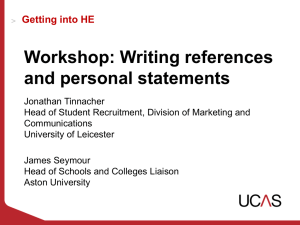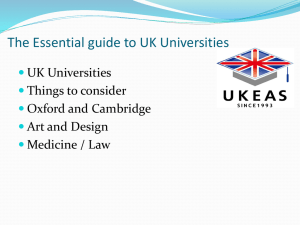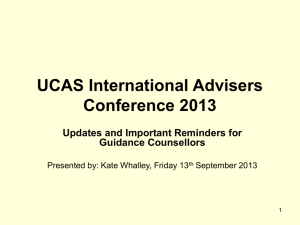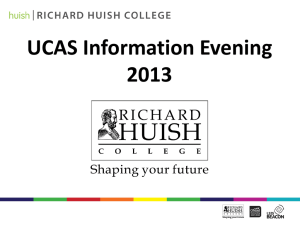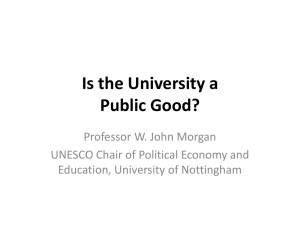Putting an Oxbridge application into context
advertisement
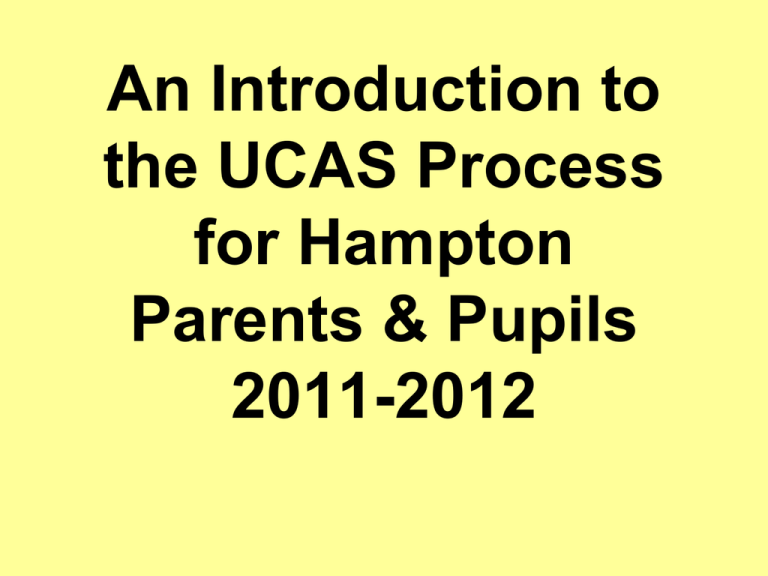
An Introduction to the UCAS Process for Hampton Parents & Pupils 2011-2012 The Higher Education Evening 7.30. The UCAS Process: a Hampton perspective Patrick Talbot, Head of Careers & UCAS. 8.00. The UCAS Process: a University perspective Matthew Harrison, University of Nottingham. 8.30. Oxford & Cambridge Entry: a Hampton perspective. Andrew Wilkinson, Senior Tutor & Oxbridge Coordinator. Lecture Theatre. or Q & A on Higher Education. Panel. Higher Education Calendar 2011-2012 Spring Term • Start of Oxbridge Programme. • CourseFinder Questionnaire & Report. • Introductory session about American University applications. • Presentation to pupils about Higher Education from the University of Southampton. Higher Education Calendar 2011-2012 Summer Term • Thursday 28th April. Higher Education Evening. • Friday 10th June. Higher Education matters: Writing a Personal Statement; Attendance at Higher Education Fair at LEH. • Thursday 30th June. Visit to the University of Bristol Open Day. Applying to university: the longer term plan • Summer 2011: make informed decisions about course and institutions. First draft of a Personal Statement completed by the end of June 10th and improvement through the term. • September 2011: complete UCAS application. Deadline for Oxbridge, Medicine, Dentistry & Veterinary applications is October 15th. Their school internal deadline is 4 pm on Monday 26th September. Everyone else: as soon as possible. Oxford & Cambridge Applicants must also … • June: finalise college and course choice. Discuss prospects for Oxford and Cambridge with relevant Heads of Department. Establish details of any prepared work you need to take for your chosen course. • Summer holidays: prepare for written tests and interviews as necessary. You will need to demonstrate a lively and well-developed interest in your chosen subject. Consolidate your Lower sixth work, and extend your knowledge to A2 and indeed beyond the A Level syllabus. You must do extra reading. Select your other university choices. Strategy for university application • 1) You perform: AS module scores achieved in Lower 6th are extremely important. • 2) We predict: Predictions by departments are based on AS module achievements and are non-negotiable. • 3) You apply to universities. All being well, you receive offers. • 4) You perform in the AS and A2 modules. • 5) You get into university by fulfilling offer(s). What sort of students do universities want? • LSE is looking for bright, questioning, self-motivated students who are not daunted by the challenge of living and studying in an extremely cosmopolitan and intellectually demanding atmosphere. • The University of Edinburgh’s Undergraduate Admissions Statement includes: • Potential to derive the greatest benefit from university study will also be assessed by adducing evidence of the applicant’s commitment to higher education, their motivation to succeed, their suitability for the chosen programme and whether they have the personal resourcefulness to handle the challenges of a university education. Research • Remember: order is important! • What subject ? then Which university • League Tables are a start but don’t take small differences in ranking to be too significant. Always look at how the rankings are scored. There are several versions of League tables. • There is a huge amount of information on www.ucas.com. Also, try www.uni-uk.co.uk and www.unistats.com. • Look over Prospectuses. Get your own copies. • Read objective accounts of universities; listen to subjective opinions. • Visit universities when you can. • Short list and then decide on choices. UCAS • The UCAS system is the medium through which you apply to universities in the UK. The Universities and Colleges Admissions Service is based in Cheltenham. • We are an all-in electronic application school, using the on-line version. The cost is £21 per candidate. Deadlines • Those of you who will apply for Oxford or Cambridge, for Medicine, Veterinary Science or Dentistry will be completing your application from the start of the Autumn term and working to completion in advance of the October 15th deadline. • We wish everyone else to complete their UCAS applications as soon as possible in October. How UCAS works • You can apply for up to five choices on the UCAS form. • There should be real consistency in the courses chosen. • Candidates for Medicine, Dentistry and Veterinary Science need only to make four choices. • Your chosen universities do not see where else you have applied. • From your offers, you make one Firm and one Insurance choice, and reject the rest. This will be around February/March/April time. • If all goes well with your A Levels, you will go to your Firm choice. The UCAS Tariff • The UCAS Tariff is the expression of the results that you need in order to satisfy any university’s entrance requirements. • However, the top or selecting universities will still require individual A Level grades: the lower or recruiting universities give points-based offers. • An A grade at A Level is worth 120 points for a six-unit award. A B is worth 100 points, and so on. Standard offers are based on 3 A Levels only – assume unless told otherwise that General Studies will not be included, nor as a rule will a single AS level. A few of the selecting universities have recently taken to giving an AS target in the offer in addition to 3 A Levels. Selecting and Recruiting Universities • If you take the rank order of the ‘league tables,’ universities towards the top have far too many applicants for available places and need to select students. • Universities towards the bottom tend to have fewer applicants per place and sometimes need to recruit students. • Hamptonians will be choosing their universities from selecting institutions, and competition is stiffest at the top of the ‘league tables.’ the most notable grouping of these selecting universities is the Russell Group. Be aware of the Russell Group • 20 leading UK universities who are research-led. Cambridge, Oxford, Birmingham, Bristol, Cardiff, Edinburgh, Glasgow, Imperial, King’s, Leeds, Liverpool, LSE, Manchester, Newcastle, Nottingham, Queen’s Belfast, Sheffield, Southampton, UCL and Warwick. • 68% of 2011 Hamptonian applications are to Russell Group universities. • For 2010 applicants, 11 of the leading 15 destinations and 62% of final applicant choices were Russell Group universities. The consistency of an application • You should plan to apply to courses broadly in line with your predicted grades. • Example: I am predicted ABB and I wish to study Geography. • • • For my 5 choices: I most want to go to Geography at St. Andrews.: typical offer is AAB. I have also selected Geography BSc at Birmingham, Leeds and Leicester. All have typical ABB offers. I have added Physical Geography at Aberystwyth. Typically 280-320 points. I have three choices in line with my predictions. I am aiming high for St. Andrews because I want to go there most. I am adding Aberystwyth in case I don’t do as well as predicted. The spectrum of my choices runs from 300 points (equivalent to BBB ) up to AAB (equivalent to 340 points). My predicted grades lie towards the top of the spectrum. My subject choice are consistent, one course being a little more specialised. • • • • • • Selling your application! • An Admissions Tutor looks primarily at certain evidence to select candidates. • Most important are the School’s predicted grades and reference. You will know your A Level predictions before you apply. • Your Personal Statement provides important support material. For an Oxbridge application, it is instrumental in getting you to the next stage of an Interview. For most non-Oxbridge applications, it may well be a substitute for an Interview! • A “count back” to your GCSE grades is also important. Some departments of some universities may formally use GCSE scores to rank candidates. The dilemma for selecting universities • Universities are increasingly dissatisfied with A Level grades as discriminators of ability. Hence, the varied use of admissions tests; the inclusion of an AS target in offers; countback to GCSEs; the acceptance of EPQs (although not inclusion in offers). Places available • Bear in mind that a university department only has so many places available. Selecting universities are oversubscribed; you may find yourself on the wrong side of a numbers game. Incidentally, universities will make more offers than it has places available. If you satisfy that offer by making the grades, then you are in! If not, don’t expect any favours! Example: applying for Economics at Nottingham • Last year they had 2,500 applications. • 1,200 of those had AAA predictions! • They gave about 200 Offers for 123 Places. Main University Destinations for Hamptonians in 2009 & 2010 In 2009 • Nottingham 19 • Oxford 18 • Bristol 10 • Bath 9 • Manchester 9 • Durham 8 • Warwick 8 • Leeds 7 • Southampton 7 • Cambridge 6 • York 6 • Imperial College London 5 In 2010 • Oxford 12 • Bristol 12 • Durham 12 • Cambridge 9 • Southampton 9 • Exeter 8 • King’s College London 7 • Warwick 7 • Leeds 6 • Manchester 5 • Nottingham 5 Summary of recent Hamptonian destinations • In 2009/2010, 43% Hampton boys went to Top 10 universities. Six years ago, we achieved 1/3. • In 2009/2010, 88% Hampton applicants went to Top 25 universities. Six years ago, we achieved 2/3.

